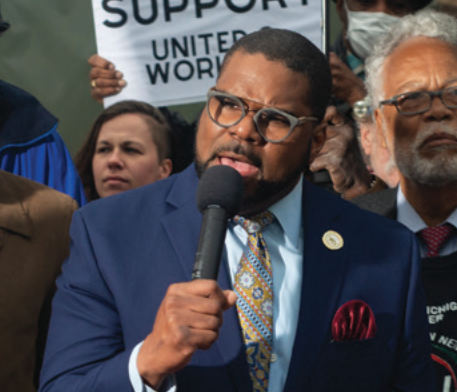
The Rev. Charles Williams II is a student in the Joint PhD Program in Social Work and Social Sciences. He is also the pastor of Historic King Solomon Church in Detroit. Where might these two paths meet?
ONGOING: Charles, you are an unusual PhD student, perhaps, because you have a whole separate career elsewhere. Or perhaps it is not so separate.
REV. CHARLES WILLIAMS II: I started pastoring 13 years ago and entered into the world of civic engagement/advocacy as a community organizer intern for MOSES, which is Metropolitan Organizing Strategy Enabling Strength. There was a lot of social work in my family. My mother, father and grandmother all have MSWs — my grandmother from U-M. For me, ministering to an underserved population has many parallels with social work. We advocate, which is (macro) social work. We engage individuals at traumatic times, which is (micro) social work. The small, neighborhood Black church is a social safety net that doesn’t often receive substantial support from government or foundations. We’re an underserved institution helping an underserved community. Everybody wants to help Black underserved communities but no one likes to work with the organizations often right in front of their face. W.E.B. DuBois said the Black church is everything for the Black community — meeting space, civil rights space, economic space, social safety net.
ONGOING: What brought you to the University of Michigan?
CW: I needed to go where I could influence policymakers, open the eyes of charitable foundations and help reimagine and contribute to decolonizing social work as a discipline. The best social work school in the country was in my backyard. For each problem we have in Detroit or even Black America for that matter, there’s someone working on an answer at the University of Michigan. I applied to the doctoral program and didn’t get in, but, as a Black man, I learned early in life that if I want something, I try every angle. So I got into the MSW program, took some doctoral courses, built relationships, did well, applied again and got into the Joint PhD program — joint with sociology.
ONGOING: How has your congregation coped with the murders of George Floyd and others?
CW: Black America has the privilege of generations of leadership aligned with the church. A spirit spoke to Harriet Tubman and prodded her to move folks north, then right on up to Dr. Martin Luther King, and now Jesse Jackson, Al Sharpton and William Barber. Reverend Sharpton said we are tired of having the white institutional knee on our neck. That spoke to us. We know that weight. We carry it. We made it through because of those individuals who had the microphone.
ONGOING: How did King Solomon respond to COVID?
CW: We got together and we mobilized, even on Zoom. The pandemic was slamming Black America. I did a funeral today and everybody had masks. Black churchgoers are more likely to be vaccinated and boosted. We have a heavy skepticism of public health — there are historical factors driving that — but we are resilient enough to make our churches available as vaccine, and testing sites, and provide groceries to deal with food insecurity.
ONGOING: What keeps you sane these days?
CW: The free space of the Black church empowers me. It’s about the only space where we can unapologetically be us. The only way for me to successfully navigate white supremacy is to spend some time in a place where it’s understood that it’s totally okay to cry, moan, holla and just sit in the stillness. You get a feeling. You know the song because your mama sang it, your grandma sang it, your great-grandma sang it and we sing it like they sang it. For the same reasons they sang it. These songs kept us through hot days on plantations picking cotton and they keep me when scrolling social media and being triggered by another police shooting.
ONGOING: Do you have a favorite song?
CW: “Father, I Stretch my Hands to the Thee” is my favorite. It is a call for liberation. Favorite jazz song would be “Footprints” by Wayne Shorter and MIles Davis.
ONGOING: Why is a PhD important to you?
CW: I’ll tell you a story. One Sunday I got a call from Ron Scott. He was an activist on police brutality in Detroit. He said, “Rev, I need you right now.” He was on the east side. He said, “The police shot a seven-year-old girl. The community is on edge. The family is distraught.” When I got there, the first thing that struck me was the abject poverty. I saw that house and I thought, We’ve got to change lives and change culture. Aiyana Jones was her name. She was the light bulb where social work became so important to me. Social work can be more effective, and the Black church has answers as to how.
White people, white social workers, like to be in charge, even if they’re there to help you. But in Black churches, Black people, Black pastors, they’re in charge. So how does a white social worker go into a Black church or a black community and work for them, with them? That’s a very interesting question to answer. That’s why I’m here.